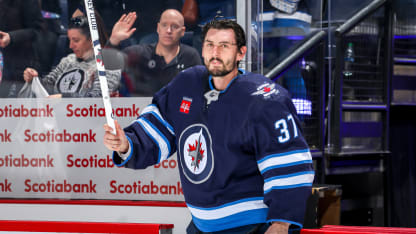"Wade is just so important to me in my career, not only on the ice but off the ice. He played the game for a long time. He knows exactly what I'm going through, raising a family and getting older, and he also learns the game with me, so I'm not alone in any aspect. You will have the same talks with the same people, where he knows exactly where my head's going. Not a lot of guys are out there like that, that care that much about improving with their goalie. It's more of I am going to teach you everything you know. 'Flats' has been both. He's taught me everything he knows and understands that every day changes, the game changes and things change around me, and he learns with me. It's just incredible to have someone in my corner that completely understands me and where I'm going."


















